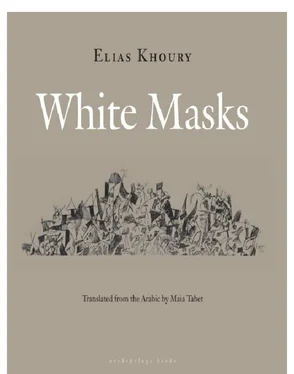“That’s great,” he said afterwards. “It’s already much better. Now, Fahd, listen, whenever you reach the word “pause,” that’s the end of that particular thought: so there should be some change, maybe alter your tone, or even wear different clothes. But on the very last sentence, ‘I was wounded, I lost my eye, do you hear me, my eye,’ you should remain absolutely still before the camera. You must not move as we film you.”
“What will you be filming?”
“We’ll be filming you taking off your dark glasses. .”
“What did you say?”
“We’ll be filming your eye, and there’ll be a voice-over with a commentary by a Red Crescent doctor on your injury.”
For a moment, I was speechless in front of that roomful of people. Then I told him I wouldn’t do it. I said I wouldn’t let them film my glass eye. No way.
“But don’t you see, Fahd, it’s really important. There’s no harm in it for you and it’ll further the cause.”
I could see everyone nodding in agreement, but I reiterated my position.
“I’m not an actor,” I said, “I’m a fighter. Maybe you should get yourself an actor, someone like Mahmud Yasin or Omar Sharif. They’re sure to do better than I could. I won’t be ridiculed.”
That’s when Samar stood up. “No, Fahd, you don’t understand,” she said.
“You explain to him,” the director told her. “It was your idea. Go on then, convince him.”
A cacophony broke out in the meeting hall with everyone talking and arguing at the same time while I stood there like an idiot. Samar came up to me.
“Fahd, we don’t want you to act. All we want is the truth.”
“What truth is that, sister? The director has just asked me to act so they could film my glass eye. I wear these shades so that no one can see it. It’s not an exhibit item for display. And you expect me to let you show it on film!”
I repeated that I wouldn’t act, not the way the director wanted at any rate. In actual fact, I wouldn’t have minded being an actor, but not like that. Goddamn, this wasn’t play-acting anymore! They wanted me to behave like some laboratory rat!
And so I walked out. I hurried down the stairs, without turning back or saying good-bye. Hearing her footsteps behind me, I slowed down, and we walked down the street together.
“How about a cup of coffee?” she asked.
“Alright, why not,” I answered.
We drove to Hamra Street in her little white Renault and went into the Modca Café.
“What got into you?” she said.
I told her I was all for acting, that I thought the screenplay was really good, but that filming my eye was out of the question.
“But that was precisely why we selected you!”
“Well, then you’ll have to find someone else. There are lots of people out there with eye injuries.”
“We chose you because you are also an educated person, an intellectual.”
“Listen to me, Samar. It is something I feel embarrassed about. It is painful, the glass is painful, and I feel ashamed.”
“Wow, that’s terrific! It’s really good, why don’t you say that in front of the camera?”
“You’re so tactless,” I told her. “You expect me to talk about my eye in front of the camera as if I’m some kind of freak!”
But then she gave me a lecture about “the cause” and the role of information.
“I know you! You fighters are all the same! You despise knowledge and intellectuals. But information is incredibly important and film is the best medium of information, maybe the most important. Imagine, thousands of spectators in Europe and America seeing an educated freedom fighter with a glass eye talking articulately about the justice of our cause, about the plight of women and children, about all the martyrs, against a backdrop of shots of Tall al-Zaatar! It would have an incredible impact! It would shift all of public opinion in the West! You underestimate the importance of information as a weapon at our disposal!”
Watching her speaking animatedly, I found her pretty. If only she’d agree to sleep with me or love me, I thought. I was ready to love her, to be smitten with her, and her small eyes, but not to appear on the screen the way she wanted.
I told her the issue was a complicated one and I would have to think about it.
“The cinema is such a fabulous thing,” she went on, “the way it can lend grandeur to events. Imagine, for instance, a sequence on Tall al-Zaatar: women, children, wailing and sobbing, the camera panning from face to face, zooming in on this cute kid with large black eyes and curly hair who’s picking his nose; the kid is totally unaware of what’s going on, as if he were unseeing, unhearing. Now wouldn’t that be fabulous?”
“Yes, that would be very powerful, it’d be really great,” I replied.
“And imagine,” she went on, taking out her Marlboros and lighting one for each of us, “just think in what original ways we could portray death! Let’s assume, for instance, that we’re filming a corpse somewhere in the old downtown: the corpse is surrounded by overgrown weeds and grasses and a high earth embankment. The camera rolls silently, stops at the corpse, then cuts to a wild flower growing among the weeds. Wouldn’t that be absolutely beautiful?”
“Yes. Yes. . but what about the smell?. . The smell would be intolerable!”
She just smiled.
“Oh, I see! Of course! The camera wouldn’t capture the smell, only the picture!”
“So you see, even death can look beautiful!”
I looked at her. Light music played softly in the background.
What does this girl know about death? She talks about it as if we were talking about the movies. . What does she know about it? If I told her about what happened to Sameeh, what would she say?
We’d gone up to the Zaarour heights by cable car, which sat under Sanneen’s silent gaze. There was snow everywhere and we were posted in one of those snow-bound two-storey chalets. We’d lit the wood stove and the five of us sat around keeping watch at the windows. I didn’t understand why I’d been stationed with them, they were all older than me, in their thirties, and I didn’t know any of them. But they were professional fighters and I felt safe with them and expressed my admiration for them as they told stories of missions they’d carried out inside occupied Palestine. We had practically forgotten there was a war going on, sitting there day after day, eating and drinking tea, playing in the snow together and listening to the radio. It was all very peaceful.
And then, all of a sudden, everything blew up. There was a huge explosion, the snow turned a deep red, and from our positions behind the windows we saw them, advancing in line formation, like a pack of wolves. Despite the fierce shelling, we were able to watch them firing and advancing, getting closer and closer. I had my Kalashnikov, so I opened fire, but still they came, and when some fell to the ground others surged forward in their place. I don’t know where I got the courage to do it. . it was the first time I’d ever fired a gun in my life, and my bullets were lethal. . I could see the advancing men falling and dying. Shells were raining down on us now, blackening our faces and hands with soot, and still we fired, round after round after round… The advance suddenly halted, giving me enough time to refill my magazine and release its contents, even though the shells kept coming down. I left my post at the window to look for the others. No one. And then, there, by the wall under the westerly window, two bodies. Looking closely, I saw Sameeh slouched against the wall in a pool of blood oozing from his waist.
“Where are the others?” I asked him. He gestured that they’d gone. “We must retreat,” I went on. He nodded in agreement. I told him to lean on me.
Читать дальше












